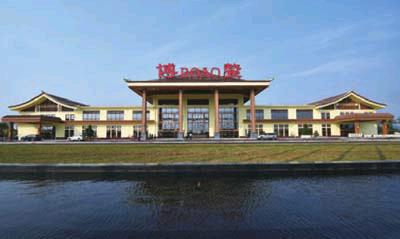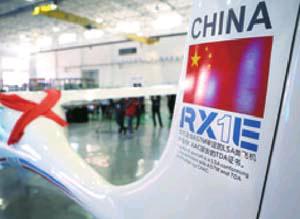New Finding
2016-03-28
An explorer prepares to enter a doline for research in Donglan County, Hechi in Guangxi Zhuang Autonomous Region, on March 3.
The 420-meter deep doline, or sink hole, was among a number discovered by a team of Chinese and French scientists during an eight-day expedition that began on February 26. Many species live in these dolines, including bats and snakes. Some as-yet unidentified vertebrates and plants have also been found.
Presidential Call
Chinese President Xi Jinping on March 5 warned against “Taiwan independence,” saying that national secession should not be repeated.
“We will resolutely contain‘Taiwan independence secessionist activities in any form,” said Xi when joining a group of lawmakers from Shanghai on the first day of the annual full session of the National Peoples Congress, held in Beijing each spring.
“Our policy toward Taiwan is clear and consistent, and it will remain unchanged along with the change in Taiwans political situation,” Xi told the legislators.
Tsai Ing-wen, the candidate for the Democratic Progressive Party, won Taiwans leadership election in January. Tsai defeated Eric Chu, candidate of the Kuomintang, which has ruled Taiwan for the past eight years.
Only by accepting the 1992 Consensus and recognizing its core implications can the two sides have a common political foundation and maintain good interactions, Xi said. The 1992 Consensus reached between mainland and Taiwan negotiators that year acknowledges that the Chinese mainland and Taiwan belong to one China.
The Chinese mainland is committed to further promoting crossTaiwan Straits cooperation and exchanges in all fields, deepening economic and social integration, and enhancing the sense of a community of common destiny, according to Xi.
Birth Policy
On March 8 Chinas top health official ruled out the possibility that China will change its family planning policy in the foreseeable future. Li Bin, Minister of the National Health and Family Planning Commission, made the remarks when addressing a press conference.
As of 2015, the Chinese population numbered 1.375 billion. Li said that Chinas per-capita economic output was “considerably low” as was the average living standard.
“Our resources pale in comparison with our vast population. Until this changes, we will continue with the current family planning policy,”she said, adding that there is no timetable for the full relaxation of the policy, although it will continue to be improved and adjusted.
China has allowed all married couples to have two children from the beginning of this year. This followed an earlier easing of previous rules in 2013 that allowed couples to have a second child if either parent is an only child.
The two-child policy is estimated to see 3 million more children born in China every year.
Aid for Women
Nearly 5 million women received micro-financing worth 247.8 billion yuan ($38.1 billion) in 2015, the AllChina Womens Federation said on March 8. Central and local government subsidies contributed more than 21.37 billion yuan ($3.28 billion) to this sum.
China began issuing microfinancing to women to encourage entrepreneurship and poverty reduction in 2009. The loans have helped boost the economy especially in underdeveloped western and rural regions.
Another policy benefiting rural women is free screenings for breast and cervical cancer, a program that also began in 2009. In 2015, more than 50 million rural women have received free cervical cancer examinations and about 7 million breast cancer tests, the federation said.
The government also provided medical assistance for 41,693 poverty-stricken women suffering from severe diseases last year.
Relics Conservation
Protection of cultural relics will be included in the evaluation of local officials performance, according to a newly released government document.
China has been striving to protect its past since the late 1970s. The 1982 Cultural Relics Protection Law created institutional guarantees and various local regulations have sprung up since.
In recent years, unmovable cultural relics were disappearing at a faster pace and responsibility of protecting them was not effectively delineated, though remarkable achievements have been made, said Liu Yuzhu, Director of the State Administration of Cultural Heritage.
According to the document, issued by the State Council, Chinas cabinet, on March 8, annual evaluations should be carried out to learn the condition of cultural relics, in addition to annual renovations.
It proposes better protection in construction work, underscoring the need for archaeological surveys, exploration and excavation. The document also calls for an improved registration system and database of resources.
Case Filing Surges
The number of legal cases filed in China from May to December 2015 hit nearly 10 million, up 29.5 percent year on year since the Supreme Peoples Court (SPC) simplified the filing system last April.
Since the establishment of a case register system, administrative cases have also increased by 66.5 percent over the same period of 2014, the SPC said in a white paper on judicial reform.
Suit documents were previously subjected to thorough and lengthy reviews before the case was accepted. The reform requires that as long as cases are filed in accordance with the law, they should be registered on the spot.
Legal cases that were traditionally difficult for the public to file, which often involved housing demolition, land requisition and government information publicity, have also seen an increase in acceptance, the white paper said.
So far, 2,189 courts have online case-filing facilities and 781 courts have apps, making the service more efficient.
The white paper also said that a platform outlining all information on court processes will provide transparent information to litigants and their attorneys.
Underground Lab
The worlds deepest subterranean lab in southwest China is building another underground space that will block cosmic rays, helping scientists trace the origin of elements. Jinping Underground Laboratory, which is 2,400 meters deep in a mountain in Sichuan Province, has begun building a nuclear astrophysics lab, the China Institute of Atomic Energy said on March 3.
This arm of physics is a frontier science that studies nuclear reactions within stars, the process that creates many elements. Research into this area provides insight into stars evolution and the origins of elements.
“The lab will offer the world a new top-class platform for conducting precise measurement on nuclear astrophysics,” said Liu Weiping, Vice Dean of the institute.
Researchers hope to use the facility to explore the birth of heavy elements by measuring neutron source reactions, according to Liu.
Scientists say cosmic rays are known to have disrupted previous observations. This new lab will provide a “clean” space for a number of physical and cosmologic experiments, including those concerns with the search for “dark matter.”
The facility opened in December 2010 and was expanded in 2014.
Securing the Title
Liu Guoliang (third left), head coach of the Chinese table tennis team, joins the players of the mens team to celebrate their victory in the final at the 2016 World Team Table Tennis Championships in Kuala Lumpur, Malaysia, on March 6.
The defending champion, China, won the mens team title for the 20th time after beating Japan 3-0 in the final. It is the eighth consecutive triumph for China in the event since 2001.
Earlier that day, the Chinese womens team made the same record at the event by winning the title for the 20th time.
Fun and Games
Women of the Miao ethnic group participate in a sports activity held to mark International Womens Day in a village in Danzhai County, Guizhou Province, on March 7.
Wellbeing Initiative
The government of northwest Chinas Xinjiang Uygur Autonomous Region will continue to allocate large sums of money in 2016 toward enhancing local livelihoods, authorities said.
A total of 110 billion yuan ($17 billion) will be administered this year to help steer 100 projects covering employment, housing, agriculture, poverty-relief and other fields in the region.
About 10,000 villages in Xinjiang will receive 500,000 yuan($76,850) each to improve livelihoods. Meanwhile, 600 million yuan($92 million) will be used for poverty relief in 1,200 poverty-stricken villages, and 24 billion yuan ($3.69 billion) will be used to build houses for 300,000 rural herdsmen.
The funding is part of a livelihood improvement initiative launched by the regional government. About 600 billion yuan ($92 billion) has been mobilized in the past six years thanks to the highprofile initiative, according to local officials.
Shrinking Exports
Chinas exports in yuan-denominated terms slumped 20.6 percent year on year to 821.8 billion yuan($126.2 billion) in February, while imports dropped 8 percent to 612.3 billion yuan ($94 billion), according to figures from the General Administration of Customs (GAC) on March 8.
Total foreign trade value in February fell 15.7 percent year on year to 1.43 trillion yuan ($220 billion), a steeper decline than the 9.8-percent contraction seen in January.
Business inactivity around the Spring Festival holiday, which fell in early February this year, overstated the year-on-year export slump.
In dollar-denominated terms, Chinas exports fell 25.4 percent from a year earlier in February, worsening from the 11.2-percent decline in January. Imports dropped 13.8 percent, a milder decrease than 18.8 percent in January.
Foreign trade in the first two months dropped by 12.6 percent from a year earlier to 3.31 trillion yuan ($508 billion), with exports down 13.1 percent to 1.96 trillion yuan($301 billion) and imports down 11.8 percent to 1.35 trillion yuan ($207 billion).
New Airport
Hainan Boao Airport, about 15 km from the Boao International Conference Center where the annual Boao Forum for Asia is held, passed its final acceptance test on March 8. The airport covers 182 hectares of land with total investment of up to 1.13 billion yuan ($174 million).
Sanctions Opposed
China is strongly dissatisfied with and firmly opposed to U.S. sanctions against Chinas telecommunication equipment maker ZTE Corp., the Ministry of Commerce said on March 8 in a statement.
“The U.S. move will severely impair normal commercial activities of the Chinese firms. China will continue to engage with the U.S. side on the issue,” according to the statement.
Earlier on March 7, Chinas Foreign Ministry urged the United States to revoke its decision to avoid damage to trade cooperation and bilateral relations.
Waste to Energy
An investment group controlled by the Beijing Municipal Government has bought Germanys largest waste management company, EEW, for 1.4 billion euros ($1.5 billion).
This is the largest ever Chinese acquisition of a German company, Beijing Enterprises Group Co. Ltd. said in a statement on March 3.
“By learning about the latest German waste-to-energy technology and management expertise, we will help environmental protection in China and contribute to green development,” said Zhou Si, Vice Chairman of Beijing Enterprises.
EEW is Germanys leading waste-to-energy firm. It operates 18 garbage incinerators in Germany and neighboring countries. In 2015, it turned 4.4 million tons of waste to energy.
Entrepreneurial Boom
Chinas entrepreneurial boom drew nearly half of the investments of the worlds venture capital (VC) and private equity (PE) funds made last year, according to a report released on March 3 by PwC.
Investment in Chinese companies reached $192.1 billion in 2015, or 48 percent of the worlds total. This represents a 169-percent rise from a year ago in China, compared with a modest 18-percent increase worldwide.
Chinese companies in tech and consumer-related sectors raised a total of $76.8 billion, six times as much from a year before.
It also found that initial public offerings (IPOs) on the Chinese stock market are the preferred choice over listing in the United States among investors for exits, as China pressed ahead reforms of its IPO system toward a registration-based model to list more companies in emerging industries.
Investors are also seeking alternative channels to cash out their investments in addition to IPOs. Among options considered by investment funds is Chinas over-thecounter market, the National Equities Exchange and Quotations, where unlisted companies can transfer their shares.
PwC also added that China dominated the Asian PE/VC market,with fundraising in the past 10 years reaching $430 million.
E-commerce Benefits Villages
Liu Yan (right) operates an online shopping website where he helps local farmers buy farming tools, daily necessities and railway tickets in Zhaomiao Town of Fuyang, Anhui Province on March 4. His booth is part of the whole provinces campaign to boost rural access to the Internet.
Shale Gas Exploitation
North Chinas Shanxi Province—the countrys largest coal producer—is considering mass exploitation of shale gas reserves as it is facing pressure to drastically cut its pollution levels.
After more than two years of surveying, geologists estimated that the province has a shale gas reserve of 4.44 trillion cubic meters, an official with the provincial land and resources department said on March 4.
The survey was conducted by Shanxi Coal Geological Bureau and two local energy companies starting in July 2013.
The basins of Erdos and Qinshui are rich in shale gas, and the thickness and high content of organic carbon and brittle minerals are suitable for exploration, the survey found.
“Exploration of shale gas will help reduce the dependence on coal and cut carbon dioxide emissions,”said the official.
The province started drilling the first shale gas exploration well in Xixian County in October 2013.
China has about 26 trillion cubic meters of shale gas reserves, the largest in the world. While regular natural gas is extracted from sedimentary rocks, shale gas, mainly methane, comes from delicate shale formations.
Parallel Imported Cars
China will boost pilots of parallel vehicle imports in its free trade zones, allowing cars to be imported without providing authorization from carmakers.
The program is a key measure to boost supply-side reforms, a current theme that includes reducing ineffective and low-end supply, a guideline published on the website of the Ministry of Commerce said.
Customs will streamline procedures related with the program to cut clearance costs for dealers and registration services for parallel imported vehicles will be improved, it said.
Such vehicles are usually cheaper than similar models from domestic dealers or simply not available through official retail channels.
The State Council piloted the plan in China (Shanghai) Pilot Free Trade Zone in 2014 before extending it to other free trade zones including Guangdong, Tianjin and Fujian in 2015.
Falling Energy Consumption
Chinas energy intensity, the amount of energy consumed per unit of GDP, has been decreasing at a rapid pace in the past few years, official data showed on March 4.
In 2015, Chinas energy intensity declined 5.6 percent from the previous year, following the 4.8-percent and 3.7-percent falls seen in 2014 and 2013, according to the National Bureau of Statistics (NBS).
Coal consumption accounted for 64 percent of primary energy use last year, down 4.5 percentage points from the share in 2012, as the government pushes for “cleaner and greener growth.”
“The data showed Chinas energy structure is becoming more diversified and optimized,” said the NBS.
China has specified that it aims to bring the share of non-fossil energy to 15 percent by 2020 and 20 percent by 2030. In addition, coal consumption will be limited to 62 percent of energy use by 2020.
The government has pledged that it will strictly control new capacity in the coal industry and that it wont approve any new coal mines before 2019.
New-Energy Plane
Chinas first new-energy plane—RX1E—has recently completed a test flight under low temperature and has since been put into mass production.
